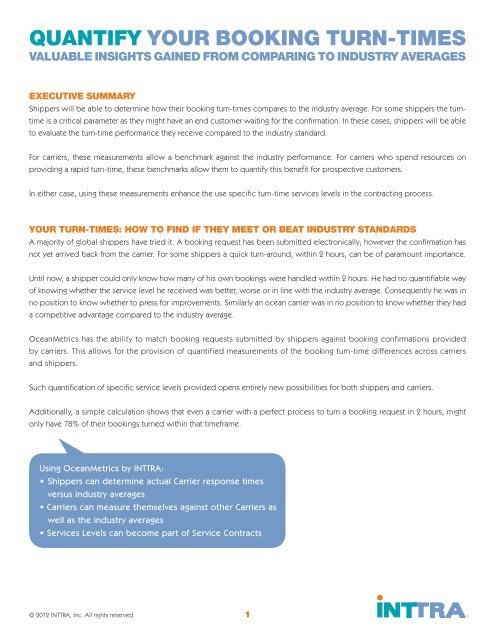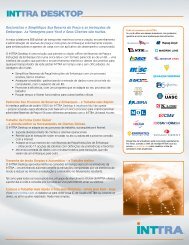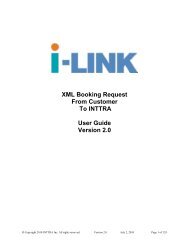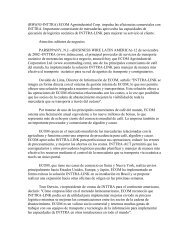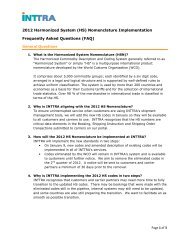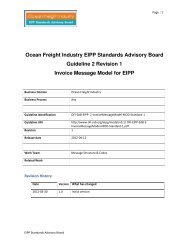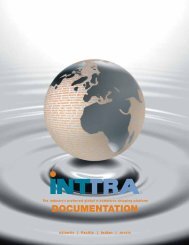QUANTIFY YOUR BOOKING TURN-TIMES - Inttra
QUANTIFY YOUR BOOKING TURN-TIMES - Inttra
QUANTIFY YOUR BOOKING TURN-TIMES - Inttra
You also want an ePaper? Increase the reach of your titles
YUMPU automatically turns print PDFs into web optimized ePapers that Google loves.
<strong>QUANTIFY</strong> <strong>YOUR</strong> <strong>BOOKING</strong> <strong>TURN</strong>-<strong>TIMES</strong><br />
VALUABLE INSIGHTS GAINED FROM COMPARING TO INDUSTRY AVERAGES<br />
EXECUTIVE SUMMARY<br />
Shippers will be able to determine how their booking turn-times compares to the industry average. For some shippers the turntime<br />
is a critical parameter as they might have an end customer waiting for the confirmation. In these cases, shippers will be able<br />
to evaluate the turn-time performance they receive compared to the industry standard.<br />
For carriers, these measurements allow a benchmark against the industry performance. For carriers who spend resources on<br />
providing a rapid turn-time, these benchmarks allow them to quantify this benefit for prospective customers.<br />
In either case, using these measurements enhance the use specific turn-time services levels in the contracting process.<br />
<strong>YOUR</strong> <strong>TURN</strong>-<strong>TIMES</strong>: HOW TO FIND IF THEY MEET OR BEAT INDUSTRY STANDARDS<br />
A majority of global shippers have tried it. A booking request has been submitted electronically; however the confirmation has<br />
not yet arrived back from the carrier. For some shippers a quick turn-around, within 2 hours, can be of paramount importance.<br />
Until now, a shipper could only know how many of his own bookings were handled within 2 hours. He had no quantifiable way<br />
of knowing whether the service level he received was better, worse or in line with the industry average. Consequently he was in<br />
no position to know whether to press for improvements. Similarly an ocean carrier was in no position to know whether they had<br />
a competitive advantage compared to the industry average.<br />
OceanMetrics has the ability to match booking requests submitted by shippers against booking confirmations provided<br />
by carriers. This allows for the provision of quantified measurements of the booking turn-time differences across carriers<br />
and shippers.<br />
Such quantification of specific service levels provided opens entirely new possibilities for both shippers and carriers.<br />
Additionally, a simple calculation shows that even a carrier with a perfect process to turn a booking request in 2 hours, might<br />
only have 78% of their bookings turned within that timeframe.<br />
Using OceanMetrics by INTTRA:<br />
• Shippers can determine actual Carrier response times<br />
versus industry averages<br />
• Carriers can measure themselves against other Carriers as<br />
well as the industry averages<br />
• Services Levels can become part of Service Contracts<br />
© 2012 INTTRA, Inc. All rights reserved.<br />
1
WHAT ARE INDUSTRY <strong>TURN</strong>-TIME RESULTS?<br />
In the past 3 months, 49% of all booking requests, irrespective of carrier, have been confirmed within 2 hours globally. This figure<br />
is known with considerable accuracy, as it is based on approximately 15% of all containers moved globally. The data spans 33<br />
different container carriers.<br />
However, each of the 33 carriers provides a different<br />
level of turn-time performance.<br />
It turns out that 28 of the 33 carriers provide a turntime<br />
below the industry average of 49%. It is equally<br />
clear that a shipper can choose between 3 distinct<br />
types of carriers. The majority of carriers provide<br />
a turn-time between 15% and 45%, and virtually<br />
any performance in this range can be found. Four<br />
OceanMetrics findings:<br />
• Industry Average: 49% of all bookings are responded to<br />
within 2 hours<br />
• 28 of 33 carriers provide a turn-time below the industry<br />
average of 49%<br />
• 4 Carriers perform significantly above the industry average<br />
carriers perform around the industry average, and four carriers provide a performance significantly in excess of the industry standard.<br />
While these numbers offhand might seem relatively low, this is not necessarily the case. With a very simple approach it can be<br />
estimated that even a very good carrier would have a turn-time performance of 78%.<br />
Assume business office hours are 08:00-17:00 for both shipper and carrier. Also assume it takes 2 hours (on average) to turn the<br />
booking. Finally assume that bookings are equally spread across the day and across the week.<br />
This means that any booking submitted after 15:00 will be delayed as it will only be completed the next morning. The<br />
consequence is that bookings received in 2 out of the 9 business hours will be late – that is 22%. Hence in this very simplistic<br />
example we would expect a carrier working with perfect processes to have a performance of 78%. This is then a more realistic<br />
benchmark in terms of what to expect.<br />
AVERAGE DELAYS IN <strong>BOOKING</strong> CONFIRMATIONS<br />
Additionally, for the booking requests which are not confirmed within 2 hours, the average response time is 51 hours. While<br />
this initially might seem like a high number, our simple example from before will illustrate that this is not necessarily the case.<br />
Bookings submitted the last 2 hours before business close will be 17 hours delayed, as they will only be turned the next<br />
morning. Additionally late Friday bookings will be 65 hours delayed due to the weekend. Therefore we would – for the<br />
perfect carrier – expect an average delay of 27 hours.<br />
A Perfect Process:<br />
• Incorporating business office hours into the calculation:<br />
– 78% of requests answered within 2 hours = perfection<br />
© 2012 INTTRA, Inc. All rights reserved.<br />
2
The OceanMetrics data shows that the 3 best performing carriers have an average delay time of 27-30 hours for those confirmations<br />
that are late. Such an average would clearly signal that the delay is purely related to the effect of office hours, and the carriers<br />
have the actual process well in hand.<br />
Some booking responses are delayed because<br />
problems arise for the carrier related to evaluating<br />
the booking. Assume such problems tend to take<br />
an extra day to solve. This would mean 24 hours<br />
additional delay, except on Fridays where the<br />
delay would be 72 hours. On average the delay<br />
will therefore be 34 hours which is to be added<br />
to the 27 hours (the effect of the office hours). We<br />
OceanMetrics findings:<br />
• Average Delays: 51 hours<br />
• Incorporating business operation hours into the<br />
calculation, expected average delay = 27 hours<br />
• The 3 best performing carriers have an average delay<br />
time of 27-30 hours for late confirmations<br />
would therefore expect more troublesome bookings to have an average delay around 51 hours.<br />
VALUE FOR SHIPPERS AND CARRIERS<br />
For shippers and carriers alike these types of benchmark measurements provide an added possibility to enhance both business<br />
value and contractual relationships.<br />
A shipper will be able to determine how the booking turn times compares to the industry average. For some shippers the turn<br />
time is a critical parameter as there might be an end customer waiting for the confirmation. In these cases the shipper will be<br />
able to evaluate the turn-time performance received compared to the value of the industry standard.<br />
Use the Analysis:<br />
• Shippers: Review how your Carriers perform<br />
• Carriers: Show off your performance or improve your<br />
performance<br />
For a carrier, these measurements allow a<br />
benchmark against the industry performance.<br />
For carriers who spend resources on providing a<br />
rapid turn-time, these benchmarks allow them to<br />
quantify this benefit for prospective customers.<br />
USE IN SERVICE CONTRACTS<br />
Easily accessible and readily available, OceanMetrics data on booking turn-time allows this service element to become part of<br />
the service contract.<br />
While both shippers and carriers could likely generate the turn-time data themselves, this is time consuming and costly. Using<br />
OceanMetrics data will continuously provide an updated service level measurement, and such a measurement could be<br />
incorporated into the contract itself.<br />
Such a contract might take many forms. For some shippers a high ratio might be of paramount importance, and hence the<br />
contract could include performance based bonuses and penalties.<br />
However, it might also take a different form. Some shippers might not need a rapid turn-time on bookings. This could be agreed<br />
in the contract – allowing the carrier to better prioritize customer service resources. Such improved prioritization would then<br />
create value in itself due to optimized resource allocation.<br />
© 2012 INTTRA, Inc. All rights reserved.<br />
3
OCEANMETRICS BY INTTRA<br />
Start a Service Based Conversation<br />
INTTRA’s OceanMetrics is a business insights platform that provides actionable ocean shipment performance intelligence based<br />
on actual carrier and shipper transactions processed on the INTTRA e-commerce platform.<br />
OceanMetrics enables shippers and carriers to measure their own performance and service levels, as well as the performance of<br />
their ocean freight partners, using a common set of information.<br />
Now shippers and carriers will have a shared understanding of consistent facts when addressing key service areas and can have<br />
unbiased conversations targeted at optimizing supply chains and improving service delivery. OceanMetrics can help:<br />
• Deepen customer and partner relationships<br />
• Quickly identify customer service improvements<br />
• Prioritize resources based on operational strengths and weaknesses<br />
• Optimize supply chain planning and execution<br />
• Elevate negotiations utilizing service and reliability measurements<br />
How to Get It<br />
Any carrier and shipper who use INTTRA’s e-commerce channels for bookings are eligible to obtain access to OceanMetrics data.<br />
What Does it Cost<br />
Obtaining access to OceanMetrics is free of charge for carriers and shippers using INTTRA.<br />
Data Quality<br />
Measurements include all transactions via INTTRA. An increased percentage of cargo booked through INTTRA automatically<br />
results in more complete and accurate data.<br />
Performance Measurements<br />
A shipper will be able to view each of their carriers’ performance. A carrier will be shown their individual performance. Competitor<br />
performance will be anonymous. The carrier may see data for other carriers, however the carriers cannot be identified by name.<br />
This allows a solid baseline for performance measurements without exposing confidential information for named carriers.<br />
© 2012 INTTRA, Inc. All rights reserved.<br />
4


